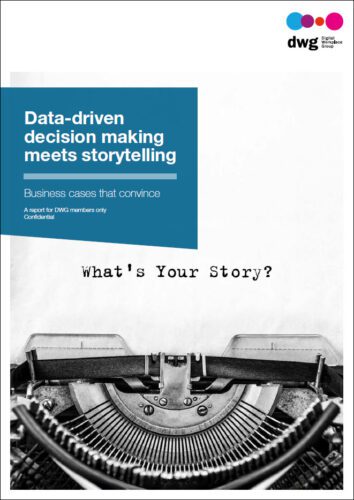What the AI-first CEO knows

According to a recent Gartner survey, CEOs are now placing artificial intelligence (AI) at the core of their growth strategies, recognizing its potential to reshape the competitive dynamics of their organizations and reimagine the future of their industries.
As technology continues to take root in the workplace, a radical rethink of leadership is demanded – one that transcends traditional paradigms and embraces AI as a transformative force capable of reshaping business strategies, cultures and ecosystems. This era heralds the rise of the ‘AI-first CEO’, a visionary leader who can navigate the complexities of AI and harness its power to redefine industries, disrupt norms and inspire innovation at every level of the organization.
In July 2024, DWG’s CEO, Nancy Goebel, introduced the ‘AI-first CEO’ as “a new leadership archetype for a new age”. This bold new leadership model views AI as a catalyst for profound change, capable of reimagining industries, uncovering untapped opportunities and creating unparalleled value. The journey to becoming such a CEO demands a shift in mindset, where agility, ethical considerations and a deep understanding of AI capabilities converge to drive innovation.
The rise of new technological advancements demands a fundamental shift in how leaders approach decision-making, strategy and workforce management. Today’s forward-thinking executives must go beyond simply understanding these technologies; they must embed them across every facet of their organization, leveraging them as foundational tools to drive innovation, enhance efficiency and sharpen strategic foresight.
So, how do AI-first CEOs steer their organizations into the future?
The AI-first CEO creates an AI-first business
For today’s CEO, the strategic landscape has fundamentally transformed. The question is no longer simply ‘Can we deploy AI?’, but rather ‘How do we lead an intelligent enterprise that thrives on AI?’.
This shift marks a deeper evolution in leadership priorities. AI is no longer viewed as a series of experimental projects or isolated process improvements. It has outgrown departmental silos and small-scale objectives. Instead, the leaders of today must recognize that the true potential of artificial intelligence lies in its ability to become embedded across the entire organization, woven into core strategies, decision-making processes and cultural foundations.
AI is not just an enhancement; it is a catalyst for reimagining the enterprise as a dynamic, intelligent ecosystem – one where innovation, agility and resilience are continuously driven by data and intelligent systems. This new reality calls for a different kind of leadership: one that sees AI not as a tool, but as a transformative force capable of reshaping industries, creating entirely new business models and unlocking unprecedented value. The AI-first CEO is at the helm of this change, guiding the organization to not only adapt to rapid technological evolution but to harness it boldly and strategically.
In this context, the critical question is no longer about technical capability. It’s about visionary leadership, seamless integration and realizing the full potential of intelligent systems in an increasingly competitive and fast-moving world.
The AI-first CEO prioritizes good data
AI is transforming the essence of leadership by enabling CEOs to rethink traditional approaches to strategy and decision-making. With tools such as predictive analytics, real-time insights and enhanced decision-making capabilities, AI enables the development of agile, responsive business models that can swiftly adapt to evolving market dynamics.
For the AI-first CEO, this means elevating decision-making from intuition to intelligence, grounding strategic initiatives in data-driven evidence. This shift cultivates a culture of precision, foresight and operational efficiency, positioning organizations to thrive amid intensifying competition.
Central to this transformation is the data environment, the foundation upon which AI delivers value. AI’s full potential requires robust, integrated data architectures that unify fragmented data sources. By establishing a connected ecosystem, data becomes a strategic asset capable of powering intelligent decision-making at every level of the enterprise.
Effective data governance is equally critical to lead the charge in defining clear policies, accountability frameworks and standards that ensure data is accurate, secure and readily accessible. This governance not only safeguards against risk but also builds trust with stakeholders, reinforcing the organization’s commitment to ethical and transparent data practices.
By investing in strong governance and high-quality data environments, leaders can create fertile ground for innovation. AI-driven tools depend on structured, reliable data to generate deep insights, predict market trends and surface emerging opportunities. With this foundation in place, the organization is empowered to make strategic, forward-looking decisions, anticipating shifts in consumer behaviour, technological disruption and competitive pressures.
The advantage of embedding AI within an optimized data ecosystem cannot be overstated. Organizations that harness AI to analyse and operationalize data don’t just gain efficiency, they increase their capacity to innovate, adapt and lead.
Ultimately, the convergence of AI and a mature data environment enables the creation of intelligent, resilient ecosystems, poised not only to withstand disruption but to drive it.
The AI-first CEO enables human creativity
In the context of a rapidly changing workforce, the AI-first CEO emerges as a transformative leader who orchestrates a symphony of human–machine collaboration. This dynamic fusion of human creativity, emotional intelligence and AI-driven automation is a recipe for innovation, redefining how organizations work, evolve and thrive in a competitive marketplace. Understanding that the true power of AI lies not in replacing human ingenuity but in amplifying it, can create a workforce that is empowered to achieve what was previously unimaginable.
A key strategy is to integrate AI into the workforce in ways that complement human strengths rather than overshadow them. By deploying AI to handle tasks requiring automation, repetition, data processing and pattern recognition, leaders can free their teams from the burden of routine activities, allowing them to focus on work that requires strategic thinking, creativity and emotional intelligence. This approach transforms AI from a tool into a collaborator that enhances human contributions, fostering a workplace culture where innovation flourishes.
For example, AI-powered platforms can analyse vast datasets to uncover insights that would otherwise remain hidden, enabling employees to make better decisions and generate bold ideas grounded in evidence. Meanwhile, human creativity and emotional intelligence come into play when interpreting these insights, crafting unique solutions and building meaningful relationships with stakeholders.
Furthermore, the AI-first CEO prioritizes the development of hybrid human–AI teams, resulting in a workforce where machines handle repetitive and data-intensive tasks while humans drive innovation through their adaptability, empathy and ingenuity. This collaboration accelerates progress, enabling organizations to adapt swiftly to changing market dynamics and seize new opportunities. By cultivating a culture of trust and empowerment, employees not only work effectively alongside AI systems but embrace them as partners in their professional journey.
Central to this approach is the focus on fostering an environment where human success is paramount. While AI can streamline processes and provide actionable insights, it is the human element – motivation, engagement and passion – that breathes life into innovation. The AI-first CEO addresses challenges such as workforce disengagement by rethinking how teams are engaged, ensuring that employees feel valued and inspired in an AI-driven workplace. By blending technology and humanity, a harmonious balance can be created, driving both operational excellence and personal fulfilment.
Ultimately, the AI-first CEO is a visionary leader who champions human–machine collaboration to unleash the full potential of their workforce. This leadership model champions the belief that AI is not a substitute for human ingenuity but a powerful amplifier of it. In this evolving narrative, organizations can be guided towards a future where technology and humanity coexist seamlessly, fostering growth, innovation and a workplace culture rooted in purpose, empowerment and adaptability.
The AI-first CEO promotes continuous learning
The AI-first CEO understands that a commitment to lifelong learning must permeate every level of the organization, from the most junior employee to the most senior executive. The rapid advancement of technology and pace of change demand an unrelenting focus on upskilling, reskilling and adaptability. This includes cultivating both technical proficiency and the ability to collaborate effectively with AI systems. Such initiatives transform the workforce into a dynamic, future-ready entity capable of leveraging the full potential of AI to navigate complexity and seize opportunities.
At the leadership level, the role of the CEO becomes pivotal. In the AI-driven workplace, it is no longer enough for CEOs to be strategic visionaries – they must also be active learners, leading by example and ensuring they are well-versed in the core capabilities, limitations and transformative power of AI. Delegating digital innovation solely to technology heads is insufficient: CEOs must take direct ownership of AI transformation, setting the vision, aligning resources and embedding AI into the organization’s strategic framework. According to a Deloitte survey, companies with CEOs who champion AI initiatives achieve notably higher success rates, demonstrating the tangible impact of leadership-driven learning.
However, the emphasis on learning is not confined to leadership alone. Junior employees, fresh to the workforce, play an equally critical role in shaping the organization’s AI-driven future. For them, continuous learning serves as both a foundation and a differentiator, equipping them with the skills needed to thrive in an environment where traditional roles are being rapidly redefined. By providing access to learning opportunities and fostering a forward-thinking mindset, organizations empower their newest members to innovate and contribute meaningfully from day one.
Mid-level managers and senior leaders, likewise, must embrace lifelong learning to bridge the gap between strategic objectives and operational execution. These leaders serve as the conduits through which AI-powered strategies are translated into actionable outcomes. Ensuring they possess an adequate understanding of AI’s capabilities allows them to drive innovation, align teams and foster collaboration between human creativity and machine intelligence.
The AI-first CEO’s commitment to learning extends beyond technical expertise, encompassing a broader vision of personal and professional growth. Lifelong learning fosters adaptability, resilience and critical thinking – qualities that are indispensable in navigating the complexities of the modern business landscape. Moreover, in the age of AI, the transformative power of continuous learning fuels innovation and reinvention across industries. High-quality learning programmes enable employees to access actionable insights derived from AI systems, anticipate market trends and develop groundbreaking ideas based on data-driven evidence.
CEOs must recognize that a well-designed learning ecosystem is critical to fostering a culture of growth and empowerment. By integrating structured learning paths with AI-driven insights, organizations ensure that employees are equipped to navigate an ever-evolving marketplace. This blend of human creativity and technological prowess catalyses innovation, enabling businesses to adapt swiftly to emerging challenges and opportunities.
What the AI-first CEO knows
The AI-first CEO represents a bold redefinition of leadership for the workplace of tomorrow. What truly sets these leaders apart is their unwavering commitment to embedding AI as the core driver of their organizations’ strategy, operations and culture. They transcend traditional leadership paradigms by seamlessly integrating AI into every facet of their enterprises, transforming challenges into opportunities for innovation and resilience.
Combining visionary thinking with a mastery of AI’s transformative capabilities, enables organizations to outpace competitors, anticipate market shifts and deliver unparalleled value to stakeholders. The AI-first CEO champions human–machine collaboration, amplifying human creativity while leveraging AI’s power to enhance precision, agility and strategic foresight. Such leadership is characterized by a deep sense of ethical stewardship, ensuring that AI is harnessed responsibly to benefit the enterprise and broader society.
In the age of intelligent ecosystems, AI-focused CEOs are catalysts for meaningful change, steering their organizations towards a future defined by purpose, adaptability and innovation. They are the architects of a new era of leadership, where technology and humanity converge to redefine industries and shape a better world.
For more digital workplace resources, DWG members have full access to exclusive articles, events, peer insights and a Research Library of 100+ reports covering key areas such as AI readiness, strategy and governance, digital workplace transformation, digital employee experience, change management and more. Contact us to learn how to gain access to this library via DWG membership.
Categorised in: → AI CEO, Artificial intelligence and automation




